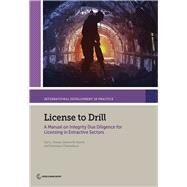License to Drill A Manual on Integrity Due Diligence for Licensing in Extractive Sectors
, by Votava, Cari L.; Hauch, Jeanne M.; Clementucci, Francesco- ISBN: 9781464812712 | 1464812713
- Cover: Paperback
- Copyright: 8/7/2018
Natural resources have the transformational potential to support economic and political stability as well as contribute to national prosperity and economic development. However, in countries dependent upon natural resource sectors, poor management of these sectors often contributes to corruption, illicit financial flows (IFFs) and thus, poverty. Adequate transparency and accountability in regulatory management of these sectors is a challenge for resource rich countries.
Poor licensing decisions in natural resource management can open a pandora’s box of corruption risks. This manual provides methods and options based on good practices to improve transparency, accountability, and integrity in the regulatory licensing process and integrity due diligence. The manual borrows models from the Basel Core Principle ‘fit and proper’ concept, and provides options for conducting effective (a) beneficial ownership; (b) criminal/legal; and (c) conflicts of interest checks, with a goal of integrating these into the regulatory licensing process. The manual also identifies common legal framework defects that can facilitate corruption risks, and offers options based on principles of regulatory integrity to reduce these risks.
The good practices identified can help countries allocate limited financial resources in conducting thorough background checks in a cost-effective manner, as well as meet EITI’s requirements for public disclosure of beneficial owners and politically exposed persons. These strategies for reducing opportunities for corruption in extractive sectors can help reduce IFFs that can sap resources from the economy and inhibit a country’s ability to achieve the Sustainable Development Goals.






